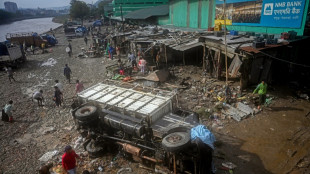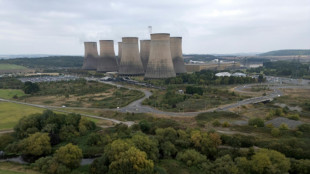
-
 Ghezal axed as Stade Francais coach
Ghezal axed as Stade Francais coach
-
Ten Hag on the brink after fresh mauling for 'disgusting' Man Utd

-
 Nepal surveys flood wreckage as death toll reaches 200
Nepal surveys flood wreckage as death toll reaches 200
-
Hezbollah vows to keep fighting Israel after Nasrallah killing

-
 India's Jaiswal hits rapid fifty after Jadeja's 300th Test wicket
India's Jaiswal hits rapid fifty after Jadeja's 300th Test wicket
-
Nepal's urban poor count cost of 'nightmare' floods

-
 France star Griezmann retires from international football
France star Griezmann retires from international football
-
Nepal surveys flood wreckage as death toll reaches 198

-
 EU states plan Friday vote on Chinese EV tariffs
EU states plan Friday vote on Chinese EV tariffs
-
France's interior minister wants referendum on immigration

-
 E.Guinea, Gabon clash at ICJ over oil-rich islands
E.Guinea, Gabon clash at ICJ over oil-rich islands
-
Typhoon pounds remote Philippine island group near Taiwan

-
 Israel conducts strike in central Beirut
Israel conducts strike in central Beirut
-
Telegram cooperates with S. Korea deepfake porn crackdown: regulators

-
 Hong Kong, Shanghai soar on China stimulus as strong yen hits Tokyo
Hong Kong, Shanghai soar on China stimulus as strong yen hits Tokyo
-
AC Milan, Inter ultras arrested for alleged organised crime offences

-
 Jadeja bags 300th Test wicket as India bowl out Bangladesh for 233
Jadeja bags 300th Test wicket as India bowl out Bangladesh for 233
-
Osaka sets up Gauff 'battle' in Beijing, Sabalenka marches on

-
 Hong Kong, Shanghai soar on China stimulus, strong yen batters Tokyo
Hong Kong, Shanghai soar on China stimulus, strong yen batters Tokyo
-
New blow for UK's Starmer as growth data disappoints

-
 Local police chief jailed for 3 years over deadly S. Korea crowd crush: Yonhap
Local police chief jailed for 3 years over deadly S. Korea crowd crush: Yonhap
-
Bangladesh's Mominul reaches 100 after India strike in rain-hit Test

-
 China's top banks to tweak mortgage rates to boost housing market
China's top banks to tweak mortgage rates to boost housing market
-
Japan's next PM aims for snap election, stocks sink

-
 Osaka sets up Gauff clash in Beijing, Sabalenka marches on
Osaka sets up Gauff clash in Beijing, Sabalenka marches on
-
Osaka powers into China Open last-16 clash with Gauff

-
 Japan's next PM eyes snap election, reports say, as stocks sink
Japan's next PM eyes snap election, reports say, as stocks sink
-
Longest-serving death row prisoner hails acquittal 'victory'

-
 Israel targets Palestinian group in first strike on Beirut centre
Israel targets Palestinian group in first strike on Beirut centre
-
Israel-UN relations sink to new depths

-
 NATO gets a new chief -- but don't expect a revolution
NATO gets a new chief -- but don't expect a revolution
-
Henry and Ravens inflict first defeat on Bills, Vikings march on

-
 Trump urges 'violent' police crackdown as Harris campaigns in Nevada
Trump urges 'violent' police crackdown as Harris campaigns in Nevada
-
Israel hits apartment block in first strike on heart of Beirut

-
 Trump to Putin: the key challenges facing Rutte at NATO
Trump to Putin: the key challenges facing Rutte at NATO
-
Kim Jong Un visits flood-hit areas of N. Korea

-
 China megacities ease homebuying rules to boost property market
China megacities ease homebuying rules to boost property market
-
Tokyo stocks dive on strong yen as Hong Kong, Shanghai extend rally

-
 Austria far-right supporters toast historic victory
Austria far-right supporters toast historic victory
-
Britain's last coal-fired power station closes

-
 Israel carries out first strike on heart of Beirut: security source
Israel carries out first strike on heart of Beirut: security source
-
US VP debate pits hillbilly energy against 'Minnesota nice'

-
 In US VP contenders, rival visions of masculinity
In US VP contenders, rival visions of masculinity
-
Leverkusen back main man Wirtz to 'shine' on European stage

-
 Arsenal's set-piece guru ready to prey on PSG weakness
Arsenal's set-piece guru ready to prey on PSG weakness
-
Padres' Arraez denies Ohtani triple crown as MLB heads into bonus day

-
 Country star, actor Kris Kristofferson dead at 88
Country star, actor Kris Kristofferson dead at 88
-
Vikings march on with win at Packers, Chiefs stay unbeaten

-
 Cup-clincher Bradley unlikely to be Ryder Cup playing captain
Cup-clincher Bradley unlikely to be Ryder Cup playing captain
-
Scott seeks another chance to win Cup in 2026 at Medinah


E.Guinea, Gabon clash at ICJ over oil-rich islands
Gabon and Equatorial Guinea faced off on Monday at the International Court of Justice, hoping to resolve a decades-old scrap over the sovereignty of three disputed islands in potentially oil-rich waters.
The two West African nations have been squabbling over the 30-hectare (74-acre) island of Mbanie and two smaller low-lying islets, Cocotier and Conga, since the early 1970s.
Unlike most contentious cases that come to the ICJ in The Hague, the two countries eventually agreed to send the thorny issue to the judges to find an amicable solution.
The dispute dates all the way back to 1900, when then colonial powers France and Spain signed a treaty in Paris setting out the borders between the two countries.
Gabon argues that a later treaty signed in 1974 -- the Bata Convention -- gives it sovereignty over the islands.
But Domingo Mba Esono, Vice Minister of Mines and Hydrocarbons of Equatorial Guinea, disputed the validity of this document.
He told the court Gabonese officials suddenly produced this treaty at a meeting between the two countries in 2003, taking Equatorial Guinea "completely by surprise".
"None of them had seen or heard of this supposed convention. Moreover, the document presented was not an original but was only an unauthenticated photocopy," said Esono.
The delegation from Equatorial Guinea questioned the legitimacy of the document and insisted Gabon present an original version, he said.
"Since then, which has been more than 20 years, Gabon has not presented anything," said Esono.
Esono said that Gabon invaded the islands in 1972 and "has occupied them illegally ever since".
The two countries have asked the court to decide which legal texts are valid, not specifically to define which nation has sovereignty.
"We are convinced the court's judgement will help our countries resolve their outstanding disputes over sovereignty and borders, creating a sustainable basis for their relations to flourish," concluded Esono.
Gabon will respond on Wednesday.
T.Bondarenko--BTB

